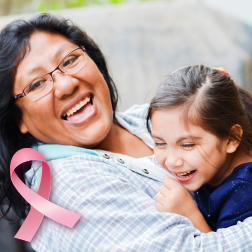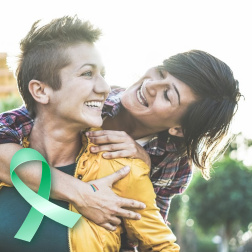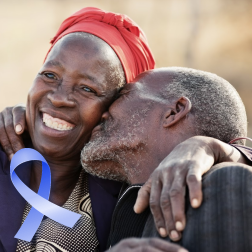Patient services
Cancer screenings
The Breast, Cervical, and Colon Health Program (BCCHP) helps eligible clients get screened for cancer and access treatment to those who are uninsured and have breast and cervical cancer.
To find out if you qualify, call our program referral line at 1-800-756-5437 or visit the Community Health Access Program (CHAP) phone assistance service website to learn more at kingcounty.gov/chap
When you should get screened for...
Breast cancer

- Breast cancer screening is recommended at ages 40-64
- At age 40 talk to a medical provider about when and how often to have a breast cancer screening
- Men and trans men and women should discuss personal risk with a medical provider and get screened accordingly
- If there is a family or personal history of cancer, talk with a medical provider
Cervical cancer

- For women ages 21-29, a Pap test alone is recommended every 3 years
- For women ages 30-64, either a HPV/Pap co-test every 5 years or a Pap test alone every 3 years is recommended
- Trans men should discuss personal risk with a medical provider
- If there is a family or personal history of cancer, talk with a medical provider
Colon cancer

The program no longer pays for screenings however colon cancer screening is recommended for all adults ages 50-64
- At age 50, a Fecal Immunochemical Test (FIT) is recommended every year
- A colonoscopy is recommended as prescribed by a medical provider
- If there is a family or personal history of cancer, talk with a medical provider
Qualifications for a free screening
- Adults who meet the above recommendations can receive breast and cervical cancer screening
- Adults who have a family history of cancer may qualify for screenings before the recommended ages
- People with either low income, lack of health insurance, or a high deductible may qualify. Call our program referral line at 1-800-756-5437 or visit the Community Health Access Program (CHAP) website.
Patient story
After experiencing pain in her breasts, a young woman decided to make an appointment with her clinic for a mammogram. At only 36 years old, she was anxious about the possibility of cancer. At the clinic that day, she received both a mammogram and an ultrasound. The results came back as "Probably Benign", but her health care provider thought it would be a good idea to follow up later in the year.
Several months later, the woman returned to the clinic and learned that her results had progressed to "Suspicious". Her provider reviewed the results and recommended that a biopsy be conducted. The patient's anxiety grew. She knew she needed the biopsy; however, she was still struggling to pay off the mammogram from January. With a high health insurance deductible of $7,050, she felt as though she could not afford another test that insurance would not cover.
I have student loan debt, credit card debt, a $1,250 rental home, among other bills such as food, gas, phone internet, and medical bills that are growing due to the newly discovered breast diagnosis," she stated. "On top of this, I just moved and had to liquidate the remaining retirement to cover moving costs. Therefore, I have no additional support to tap into."

She continues: "I do not have family that can help cover these costs, so I am feeling tremendously overwhelmed and frustrated. My insurance deductible is $7,050 and that is the cheapest healthcare I can afford."
While figuring out how she was going to pay for her treatment, the patient learned about BCCHP. She reached out and the program determined she was eligible for support. BCCHP could cover whatever her insurance did not. "I am grateful for anything you can do. So much!" she exclaimed, relieved.
She has since completed the recommended diagnostic tests and is scheduled for a procedure to remove the pre-cancerous tissue. BCCHP was able to cover the costs of her tests, which helped find and treat her pre-cancer diagnosis early.
External resources
- 10 Things You Can Do Right Now to Help Prevent Cancer, AARP
- American Cancer Society
Provides health education, cancer information and more. - Phone: 1-800-227-2345 National Cancer Helpline; stay online for language translator support
- CANCERcare
A national nonprofit organization whose mission is to provide free professional support services to anyone affected by cancer: people with cancer, caregivers, children, loved ones, and the bereaved. - Phone: 1-800-813-HOPE (1-800-813-4673); info@cancercare.org
- National Cancer Institute
Health and cancer education materials, help with quitting smoking, librarians can answer questions about cancer. Spanish-speakers available. - Phone: 1-800-4-CANCER, (1-800-422-6237)
- Cancer Lifeline
Offers a wide range of programs, support groups, financial assistance, classes, activities and presentations aimed at optimizing the quality of life for cancer patients and cancer survivors and their families, friends, co-workers and caregivers. All services free of charge. - Phone: 206-297-2100, 206-297-2500, 1-800-255-5505
- Cancer Risk and Prevention, American Cancer Society
- Crisis Connections
Helping Lives on the Line and 211 and other resources available in multiple languages. - Phone: 1-866-4CRISIS (427-4747) for 24-hour assistance for people with emotional crisis
- Phone: 1-800-621-4636 for 211 Community Information online available from 8 am - 6 pm
- Cancer Pathways
Offers programs of education, support and community options for people living with cancer along with their families and friends. - Phone: 206-709-1400, 866-200-2383
- EthnoMED
Culture, language, health, illness and community resources directly accessible to health care providers who see patients from different ethnic groups. - Hopelink
Serves homeless and low-income families, children, seniors and people with disabilities, promoting self-sufficiency for all members of the community. Transportation to medical appointments is provided to all Medicaid patients in King County. - Phone: 1-800-923-7433
- Living Beyond Breast Cancer
Cancer Survivors Help Line: 888-753-5222
- Cancer resources from MedlinePlus, National Institutes of Health
Includes a dictionary of cancer terms and more. See information on chemotherapy. - College of American Pathologists
Information about the disease, treatment options, key terms, pictures of normal and diseased tissue, questions to ask your doctor. - Cancer Genetic Counseling Resources
- Swedish Hospital Medical Center – Hereditary Cancer Clinic
- 1221 Madison, Suite 1220, Seattle, WA 98104
- Phone: 206-215-4377 for appointments
- University of Washington Medical Center – Medical Genetics Clinic
- 1959 NE Pacific, Seattle, WA 98195
- Phone: 206-598-4030
- Operation Uplift
Provides no-cost support groups, prosthesis, wigs, head coverings, mammogram vouchers and limited financial assistance for transportation. - 118 N. Liberty St. Port Angeles, WA 98362
Phone: 360-457-5141 (Limited hours, call first) - Patient Advocate Foundation
National non-profit that uses case managers and healthcare attorneys to act as a liaison for complex situations between patients and insurers, employers, creditors, etc. (Clinics should help first with simpler problems).- Phone: 800-532-5274
- Partnership for Prescription Assistance
Access to over 475 prescription assistance programs, covering more than 2500 medications - Phone: 888-477-2669
- Washington Prescription Discount Program
Open to all Washington state residents who do not have prescription drug insurance coverage or whose insurance does not cover all of their prescription drug needs. - Phone: 888-913-4146 or apply online
- RX Outreach
Provides prescription drug assistance for clients based on income and number of dependents living in their home. - Phone: 1-888-796-1234
- NeedyMeds
A national non-profit helping people locate assistance programs to help them afford their medications and other healthcare costs.
- Department of Social and Health Services, Community Service Offices
General information about Medicaid benefits - Phone: 800-562-3022
- Crisis Connections, King County 2-1-1
Provides community resources and information about social and human services - Phone: 800-621-4636
- Medicare for qualified beneficiaries
- MyMedicare.gov or call 1-800-MEDICARE
- Statewide Health Insurance Benefits Advisors (SHIBA)
SHIBA helps you to understand health care coverage options and rights; find affordable health care and evaluate and compare health insurance plans. - Phone: 800-562-6900
- Susan G. Komen for the Cure, Puget Sound affiliate
Supports innovative research and community-based outreach, education and treatment support activities. Breast health educational materials at no cost.- Phone: 206-633-0303
- Phone: 206-633-0303
- Team Survivor Northwest
Broad range of fitness and education programs at any stage of cancer recovery, at any fitness level.- Phone: 206-732-8350

 Translate
Translate